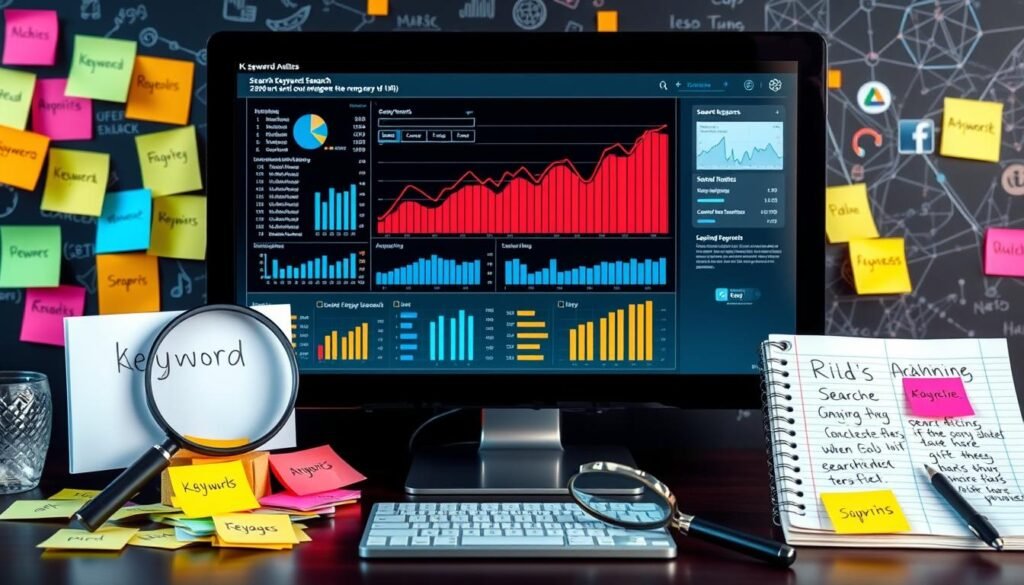Want to make your website more visible and get more organic visitors? It’s important to know and use google SEO strategies well. This article will give you helpful tips and best practices for search engine optimization. These can greatly improve your site’s search engine rankings.
Starting with SEO basics and moving to advanced tips, this guide is here to help. You’ll learn how to handle google SEO with confidence. Get ready to change your website and increase your organic traffic like never before!
Key Takeaways
- Learning SEO basics is key for online success.
- Google SEO is important for bringing visitors to your site.
- Good keyword research makes your site more visible.
- On-page techniques improve your search rankings.
- Great content and building links are crucial for SEO.
- Technical SEO helps your site work well and be mobile-friendly.
- Using Google Analytics lets you watch your site’s progress.
Understanding SEO Basics
Search engine optimization, or SEO, is key in the digital marketing world. It involves improving a website’s design, content, and overall performance. This boosts its visibility in search engine results. By using smart SEO strategies, businesses can better their website’s effectiveness and strengthen their presence online. Learning the basics of SEO brings big rewards.
What is SEO?
SEO includes various strategies aimed at bettering rankings in search engine results pages (SERPs). These strategies involve optimizing content, speeding up the site, and making sure it works well on mobile devices. The main aim of SEO is to draw more visitors, which can lead to more leads and sales. A solid base in SEO helps a business seem more credible and connects it more effectively with its target audience.
The Importance of SEO for Your Website
For any online business, implementing strong SEO practices is crucial. Without it, even top-notch content might not get noticed. SEO helps make sure a website is easy to find. Plus, it aids in forging a trustworthy online presence. In today’s world, being visible online is critical. A balanced SEO approach can help a business stand out against its rivals.
Why Google SEO Matters
For any online business, 구글 seo is key. It boosts organic traffic and gives you a competitive edge. Focusing on Google SEO can greatly improve your visibility and brand.
How Google SEO Drives Traffic
Google SEO helps increase organic traffic. Websites that rank high in search results attract more visitors. Nearly 95% of clicks go to first-page listings.
By using the right keywords and improving your website, you can get more traffic. This isn’t just any traffic, but people looking for what you offer.
Staying Ahead in Competitive Markets
In busy markets, having good products isn’t enough. You need strong marketing, like Google SEO, to beat competitors. It involves analyzing rivals and optimizing based on data.
Using tools like Google Analytics is crucial. They help you see what’s working and change your strategy as needed. This ensures success in the digital world.
Effective Keyword Research Techniques
Keyword research is the core of any SEO plan. It’s how you increase your site’s visibility and attract the right visitors. By knowing what your audience looks for, you can match your content to what they want. This lets you choose keywords that will work best for you.
Finding the Right Keywords for Your Niche
Think about words linked to your topic. Use different versions that people might search for. Long-tail keywords are less competitive but more likely to convert. Aim for searches like “best gardening tools” or “affordable web design services.” Google Keyword Planner can show you keyword trends and help you pick the right ones.
Using Tools for Keyword Optimization
SEO tools are key for refining your keyword approach. Tools like SEMrush, Ahrefs, and Moz can give you deep insights. They help you see how hard keywords are to rank for and find related terms. Using this data can make your content reach its intended audience more effectively.

| SEO Tool | Primary Function | Best For |
|---|---|---|
| Google Keyword Planner | Keyword volume and trends | Paid search campaigns and finding new keywords |
| SEMrush | Comprehensive SEO analysis | Competitive analysis and keyword gaps |
| Ahrefs | Website analysis and backlinking | Keyword research and site audits |
| Moz | Search engine optimization data | Beginner SEO optimization |
On-Page Optimization Strategies
Learning about on-page optimization is key for better search engine ranks. It involves things like meta tags and header tags. These elements let search engines understand your web page’s content and structure. By using these strategies well, your visibility and user experience improve.
Meta Tags and Descriptions
Meta tags are very important for on-page optimization. They give important details about your page to both search engines and users. The major parts are the title tag and meta description. The title tag needs to have the right keywords. It should clearly show what the page is about. It’s best if it’s between 50-60 characters.
- Title Tags: They should include main keywords, be short but catchy.
- Meta Descriptions: They should briefly tell what’s on the page, in 150-160 characters, to get people to click.
Using meta tags well helps in getting more clicks. This can lead to possible higher rankings in search results.
Using Header Tags Effectively
Header tags are critical for on-page optimization. These tags range from H1 to H6 and help in organizing content. They make it easy for users to move through the page. An H1 tag is usually the page title. H2 and H3 tags help split up the information. This structure helps users and search engines understand the content better.
“Header tags, when used correctly, enhance readability and improve SEO performance,” an industry expert stated.
To make the best use of header tags, keep these in mind:
- Every page should have one H1 tag focused on the main topic.
- Use H2 tags for main sections and H3 tags for smaller parts.
- Put relevant keywords in your header tags when you can.
Content Marketing Best Practices
Effective content marketing is key to making your website more visible and engaging. It’s important to focus on high-quality content that your audience loves. Content should provide value and boost your SEO, helping your site rank better in search engines.
Creating High-Quality Content
Great content is the foundation of successful content marketing. It starts with knowing your audience well. Writing articles that are engaging, informative, and relevant will draw in and keep visitors. Also, offering new insights and answering frequent questions boosts user happiness.
Utilizing Blogs for SEO Benefits
Blogs do two things: share knowledge and improve your site’s SEO. Keeping a blog updated lets you use important keywords. This can make your site rank higher. Good blog posts build a base of regular readers, bringing more visits to your site.
Incorporating Visual Elements
Using visuals like images, infographics, and videos makes content more engaging. They make long texts easier to read. Visuals help in keeping readers’ attention and encourage them to share your content. They add beauty and improve both readability and SEO strategy.
Link Building Techniques
Link building boosts your website’s authority and ranking on search engines. Knowing the role of backlinks is key for online success. These links signal your site as credible and enhance its visibility online.
Understanding the Importance of Backlinks
Backlinks are incoming links from other sites. They show that your content is valuable. A solid strategy for link building enhances your site’s search performance. High-quality backlinks lead to better search rankings.
How to Build Quality Links
There are effective ways to get good links. Here are a few:
- Guest Blogging: Write for well-known websites in your field. It lets you share your knowledge and earn backlinks.
- Partnerships: Work with other companies or influencers. Good relationships in your field can lead to great backlinks.
- Shareable Content: Create things people want to share. Great infographics, studies, and articles can inspire backlinks.
But remember, not every backlink is good. Aim for links from respected sites to benefit your link building work.

| Link Building Strategy | Benefits |
|---|---|
| Guest Blogging | Establishes authority and drives traffic. |
| Partnerships | Builds relationships and creates mutual benefits. |
| Shareable Content | Increases visibility and attracts organic backlinks. |
Technical SEO Essentials
Optimizing your website’s technical aspect is crucial. This includes boosting site speed and making sure it’s mobile-friendly. A quick site improves the user’s experience, potentially boosting search rankings. Since more people use mobile devices for web browsing, making your site mobile-ready is vital. Using the right methods can greatly improve your site’s traffic and user engagement.
Improving Website Speed
How fast your website loads is key for keeping users happy and on your site longer. If your website takes too long to load, people are more likely to leave. To make your site faster, try these tips:
- Optimize images by compressing them without loss of quality.
- Minimize the use of heavy scripts and CSS files.
- Utilize browser caching to enhance loading times.
- Choose a reliable hosting provider that meets performance needs.
Mobile Optimization Strategies
Now, mobile devices are a major source of web traffic, so having a mobile-optimized site is key. A responsive design makes sure your site looks great on any device, which improves its usability. To make your website better for mobile users, consider the following:
- Ensure that text is legible without zooming.
- Implement tap-friendly buttons to facilitate easy navigation.
- Utilize mobile-specific features, such as click-to-call buttons.
- Regularly test your site on various mobile devices for compatibility.
Local SEO Strategies
Optimizing for local SEO is crucial for businesses wanting to draw in nearby customers today. It helps businesses show up in local search results, better serving their communities. Key steps include improving the Google My Business profile and getting local reviews.
Enhancing Your Google My Business Profile
A strong Google My Business profile boosts local visibility. Consider these important factors:
- Complete your profile: Make sure all sections are filled out, including business name, address, phone number, and hours.
- Add high-quality images: Use photos to highlight your products, services, or place to attract more customers.
- Utilize posts: Keep your profile fresh with regular updates on offers, events, or news to keep your audience engaged.
- Leverage categories: Picking the right categories helps you show up in the right searches.
Gathering Local Reviews
Local reviews are key to earning trust and credibility with potential customers. Follow these steps to collect more reviews:
- Ask satisfied customers: Urge happy clients to leave positive reviews following a good experience.
- Respond to reviews: Show you care by replying to all feedback, whether it’s good or bad.
- Make it easy: Offer direct links to your Google My Business profile for a simple review process.
- Promote reviews: Share great reviews on your website and social media to highlight happy customer experiences.
With these strategies, businesses can boost their local search results. This improves community ties too.
Utilizing Google Analytics for SEO
To make the most out of your website, using Google Analytics is key. It helps you accurately check your site’s success. You can see what’s working well and what needs better SEO tactics.
Measuring Your Website Performance
Google Analytics makes reviewing your site’s performance easy. You’ll look at page views, how often visitors leave quickly, and their time on your site. This info shows if your content and SEO are hitting the mark. It helps make choices to better the user’s experience and your site’s overall function.
Tracking User Behavior and Engagement
It’s vital to know how users act on your site for its ongoing success. Google Analytics tracks how engaged your visitors are. It shows you what they like. Using this data helps you adjust your content to what your audience prefers. It keeps your site strong and attractive to visitors.

